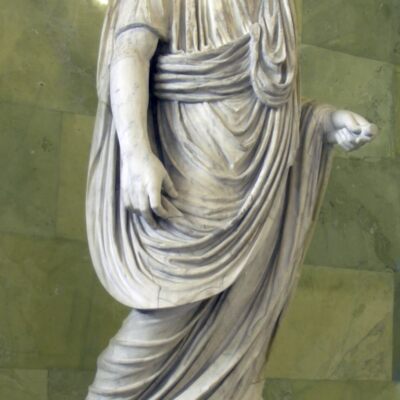Citizenship of Rome (cives Romani) could be acquired as follows:
- by being born of parents, Roman citizens (legally regulated by Lex Unicia for Emperor Hadrian, also Roman and Latin child received Roman citizenship);
- as a result of settling in Rome (ius migrandi) – concerned Latins (based on Lex Iulia and Lex Plautia Papiria of 90 and 89 BCE);
- as a result of formal liberation (i.e. according to ius civile). The following examples can be cited here: acquiring citizenship as a reward for developing the desired population, order or economic activity (keeping up of male offspring, serving in the city guard, building a house in Rome or organizing delivery of grain to Rome);
- as a result of granting citizenship. The authorities entitled to do so were the comitia and later the emperor. He used this method in 212 CE. Emperor Caracalla, adopting a law Constitutio Antoniana declaring Roman citizens peregrini dedici residents of Rome;
- as a result of purchasing citizenship.
A number of entitlements of Roman citizens arose from being subject to ius civitatis. Ius civitatis was necessary to have full legal capacity, which in turn enabled it to act on its own behalf or through a representative. This right provided the citizen with private and legal positions, such as: ius conubi – the right to marry (matrimonium); ius commerc – the right to conclude contracts according to ius civile; ius legis actio – a law giving the right to lodge a complaint with a court.
The possession of ius civitatis was also associated with specific public-legal positions for the citizen. We can include: service in legions, the right to vote at people’s assemblies – ius sufragi, the right to occupy public positions – ius honorum, the right to occupy positions in state administration – autocrati, the right to wield power – potestas, the right to property – dominium and testamentary ability – testamenti factio (which in turn enabled the active right to test – testamenti factio activa – that is, the right to make a will, and the passive right – testamenti factio passiva – the right to inherit.
Owning ius civitatis, during Rome’s splendour, also gave the right to tax exemption. As for the ways of losing citizenship, it followed: as a result of the loss of unmarried status (e.g. sold into slavery), as a result of obtaining citizenship of a foreign state, and by issuing an outlaw ban – aquae et ignis interdictio, also by Senate judgment – crimina. In addition to Roman citizens, people with certain, but significantly limited to citizens, were Latins (Latini) and foreigners (peregrini).
Latins are peoples close to the origin of the Romans, residents of Latium in the areas adjacent to the Romans, allied with the Romans. Initially, it is Latini prisci or Latini veteres (so-called former). They could obtain citizenship by settling in Rome. Beginning in 493 BCE. Latins gained an increasingly privileged status. They had: ius migrandi – entitlement to acquire Roman citizenship after settling in Rome, conubium – entitlement to marry Romans, ius commercium – the law giving the opportunity to participate in the legal transactions of the Romans and testamenti factio – entitlement to use Roman Testament law devices.
Beginning with the 3rd century BCE in connection with the territorial development of the republic, additional new categories of Latins began to appear. They were: Latini coloniari – inhabitants of Latin colonies, i.e. established according to Latin law, and Latini Iuniani so-called Justinian liberators from Latin America according to praetor’s law.
Peregrines are foreigners residing in Rome, the remaining free inhabitants of the Roman state. Peregrines came from areas conquered by Rome, recognizing Rome’s sovereignty. They are known for peregrini certae civitas – they used their own municipal law, and in conflict situations Roman ius gentium and peregrini dediticii – peregrines from conquered areas, not recognizing the sovereignty of Rome, occurred where the local organization of municipalities was destroyed. They only embraced the general sovereignty of Rome, in conflict situations they used the Roman ius gentium. After the release of Lex Aelia Sentia, this category was joined by freedmen from slaves punished before the liberation of dediticii Aeliani, their legal position was worse than that of dediticii.
The category peregrini certae civitas was abolished in 212 CE as a result of the aforementioned constitutio Antoniana, while the category peregrini dediticii was liquidated only during the reign of Emperor Justinian.
Historically, Roman citizenship was granted to ever-larger groups of the empire’s inhabitants, which resulted from the territorial development of the state as well as from the development of Roman society itself. The largest historically in this respect were the events in 89 BCE, as a result of the war started in 90 BCE. with the inhabitants of Italy, on the basis of lex Iulia et Plantia Papiria, Roman citizenship was granted to all free inhabitants of Italy. In 86 BCE census of Roman citizens, showed 463,000 civies Romani. Then, the aforementioned Constitutio Antoniana, published by Emperor Caracalla in 212 CE, equated all inhabitants of the Roman Empire, giving them Roman citizenship.







